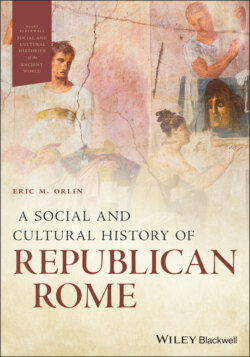Читать книгу A Social and Cultural History of Republican Rome - Группа авторов - Страница 9
Acknowledgments
ОглавлениеThe idea of writing a textbook on Roman history began on a long drive from Calgary, Alberta back to Berkeley, California, after attending the Annual Meeting of the Association of Ancient Historians. Fired up by presentations at the conference, two graduate school friends, Judy Gaughan and Beth Severy, and I brainstormed what we might do if we ever decided to write a textbook.
Thankfully this book is not the crazy text that three sleep-deprived students conjured out of the midnight air as we crisscrossed the Pacific Northwest. However, that night did plant the seed, of what parts of the story are often omitted or of how one might try to tell the story of the Roman Republic differently. As I taught courses over the past twenty years, I tried to include as many of those parts as I could, always looking for different ways to tell the story. My courses always involved a significant focus on religion, the family, social structure, arts and letters, and the economy, and I often found myself frustrated that even the new wave of excellent Roman history textbooks did not devote the space I wanted to these topics. When Wiley informed me that they were developing a series of textbooks for the ancient world focused on social and cultural history, I felt I had to say yes, even as I felt there had to be people more qualified than I to write it.
A book such as this does not stand on its own: it rests on the work of many scholars who have written in greater depth on various subjects covered in this book. Indeed, one of the great challenges of this book has been to take brilliant ideas of others expressed in a book of 80 000 words and try to shrink them down to 500 words. Most of these books can be found in the Further Readings section, but I want to acknowledge my debt also to those authors whom space prevented me from listing. I want to express particular appreciation to colleagues and friends who took the time to read chapters and try to save me from as many mistakes as possible: Bill Barry, Douglas Boin, Lee Brice, Judy Gaughan, Matthew Loar, Carolyn MacDonald, Carlos Noreña, Andrew Riggsby, Brett Rogers, Nate Rosenstein, Beth Severy-Hoven, and Jesse Weiner. Special thanks go to Nandini Pandey, who not only read chapters multiple times, but also offered encouragement at critical moments. The mistakes that remain, however egregious, are my own fault.
Words cannot begin to express my appreciation to my colleagues in the Department of Classics and Ancient Mediterranean Studies at the University of Puget Sound: Bill Barry, Aislinn Melchior, and Brett Rogers, as well as colleagues who have spent time with us including Megan Daniels, Matthew Gorey, Kyle Helms, and Megan O’Donald. They have all been excellent companions on my journey and have expanded my horizons as I worked through different elements of teaching the Roman Republic. The Provost at the University of Puget Sound, Kristine Bartanen, offered invaluable support in the form of both time and treasure. My wife and boys deserve special mention for putting up with my rants on topics from the Romans to racism and everything in between.
Appreciation is also due to many generations of students at the University of Puget Sound, who tolerated me as I led them through these topics year after year and who taught me more about the texts and teaching them. That is doubly true for the past two generations of students who allowed me to inflict early drafts of several chapters on them. I also wish to thank the students in HIST 491 at CSU Pueblo in the fall of 2020, who read the chapter on Law and allowed me to Zoom into their class for discussion and critique. Finally I want to thank my two partners on that long overnight drive many years ago, Judy Gaughan and Beth Severy-Hoven, who have continued to put up with me after all these years, to support and correct me even when I go wrong, and to open up new vistas of understanding for me. I have learned more in the process of writing this book than I ever would have imagined, and I am grateful to all those who taught me along the way.
